Sources said Japanese automakers Honda and Nissan are discussing a plan that would see Honda sell vehicles produced by Nissan in the United States. Under the plan, pickup trucks made at an under-utilized Nissan plant in the US would be sold under the Honda brand.

Sources said Japanese automakers Honda and Nissan are discussing a plan that would see Honda sell vehicles produced by Nissan in the United States. Under the plan, pickup trucks made at an under-utilized Nissan plant in the US would be sold under the Honda brand.
Honda likely aims to expand its customer base through the deal. It would also help Nissan, whose US plants have been operating below capacity due to sluggish sales. Additional US import tariffs on autos and auto parts have heightened the pressure on Nissan to make better use of its American production base. Honda and Nissan's discussions come despite a failed attempt to merge earlier this year.
mitv
Sources said Japanese automakers Honda and Nissan are discussing a plan that would see Honda sell vehicles produced by Nissan in the United States. Under the plan, pickup trucks made at an under-utilized Nissan plant in the US would be sold under the Honda brand.
Honda likely aims to expand its customer base through the deal. It would also help Nissan, whose US plants have been operating below capacity due to sluggish sales. Additional US import tariffs on autos and auto parts have heightened the pressure on Nissan to make better use of its American production base. Honda and Nissan's discussions come despite a failed attempt to merge earlier this year.
mitv
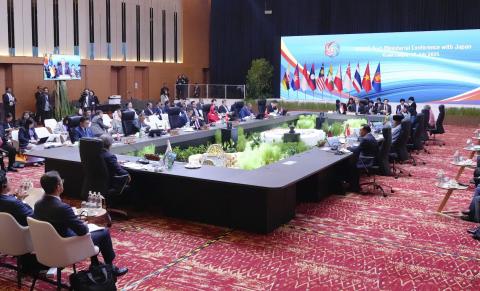
KUALA LUMPUR - Japanese Foreign Minister Takeshi Iwaya called for a "free, fair and open" international economic order in his talks Thursday with his ASEAN counterparts in Malaysia, amid trade tensions stemming from the threat of steep U.S. tariffs against Japan and the group's members.
KUALA LUMPUR - Japanese Foreign Minister Takeshi Iwaya called for a "free, fair and open" international economic order in his talks Thursday with his ASEAN counterparts in Malaysia, amid trade tensions stemming from the threat of steep U.S. tariffs against Japan and the group's members.
Noting the 10-member Association of Southeast Asian Nations is "at the center of global growth," Iwaya said Japan is eager to strengthen cooperation with the regional bloc, adding its role has been "increasingly important for regional peace and prosperity."
With the tariffs proposed by U.S. President Donald Trump in mind, the Japanese minister stressed the need to "maintain and strengthen" the multilateral trading system with the World Trade Organization at its core.
Trump has said the United States will impose a 25 percent tariff on imports from Japan starting Aug. 1, while goods from six ASEAN members will face up to 40 percent duties.
At the talks, ASEAN ministers pointed to the importance of ensuring freedom of navigation in the South China Sea and resolving disputes in the waters based on the U.N. Convention on the Law of the Sea, the Japanese Foreign Ministry said, amid tensions between China and some ASEAN members over territorial rows.
The Japanese minister also unveiled Tokyo's plan to boost people-to-people exchanges with ASEAN nations, including the dispatch of some 600 "Japanese language partners" to the region by the end of March next year.
Iwaya separately met with his counterparts from the Mekong countries -- Cambodia, Laos, Myanmar, Thailand and Vietnam -- and vowed to boost Japan's cooperation with them in such areas as disaster prevention, decarbonization and digitalization, as well as efforts to tackle cross-border crimes including online fraud.
The other ASEAN members are Brunei, Indonesia, Malaysia, the Philippines and Singapore.
In a joint statement, Japan and the five Mekong countries underscored the need to address transboundary issues such as cybercrimes, online scams and money laundering. Japanese nationals are among those involved in online fraud operations run by criminal organizations that have bases in Southeast Asian countries such as Myanmar and Cambodia.
Japan and the Mekong nations also recognized the importance of holding a new round of summit meetings involving their leaders. They last held a leaders' gathering in a video conference format in 2020.
Ref : Kyodo News
KUALA LUMPUR - Japanese Foreign Minister Takeshi Iwaya called for a "free, fair and open" international economic order in his talks Thursday with his ASEAN counterparts in Malaysia, amid trade tensions stemming from the threat of steep U.S. tariffs against Japan and the group's members.
Noting the 10-member Association of Southeast Asian Nations is "at the center of global growth," Iwaya said Japan is eager to strengthen cooperation with the regional bloc, adding its role has been "increasingly important for regional peace and prosperity."
With the tariffs proposed by U.S. President Donald Trump in mind, the Japanese minister stressed the need to "maintain and strengthen" the multilateral trading system with the World Trade Organization at its core.
Trump has said the United States will impose a 25 percent tariff on imports from Japan starting Aug. 1, while goods from six ASEAN members will face up to 40 percent duties.
At the talks, ASEAN ministers pointed to the importance of ensuring freedom of navigation in the South China Sea and resolving disputes in the waters based on the U.N. Convention on the Law of the Sea, the Japanese Foreign Ministry said, amid tensions between China and some ASEAN members over territorial rows.
The Japanese minister also unveiled Tokyo's plan to boost people-to-people exchanges with ASEAN nations, including the dispatch of some 600 "Japanese language partners" to the region by the end of March next year.
Iwaya separately met with his counterparts from the Mekong countries -- Cambodia, Laos, Myanmar, Thailand and Vietnam -- and vowed to boost Japan's cooperation with them in such areas as disaster prevention, decarbonization and digitalization, as well as efforts to tackle cross-border crimes including online fraud.
The other ASEAN members are Brunei, Indonesia, Malaysia, the Philippines and Singapore.
In a joint statement, Japan and the five Mekong countries underscored the need to address transboundary issues such as cybercrimes, online scams and money laundering. Japanese nationals are among those involved in online fraud operations run by criminal organizations that have bases in Southeast Asian countries such as Myanmar and Cambodia.
Japan and the Mekong nations also recognized the importance of holding a new round of summit meetings involving their leaders. They last held a leaders' gathering in a video conference format in 2020.
Ref : Kyodo News
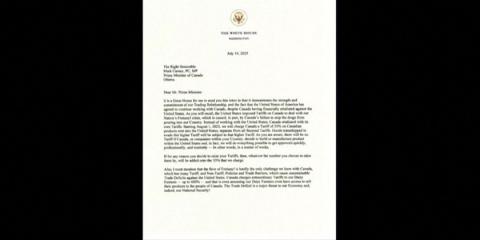
Canada will face a 35 percent tariff on exports to the United States starting August 1, President Donald Trump said Thursday in a letter to Prime Minister Mark Carney. Canada and Mexico are both trying to find ways to satisfy Trump so that the free trade deal uniting the three countries - known as the USMCA - can be put back on track.
Canada will face a 35 percent tariff on exports to the United States starting August 1, President Donald Trump said Thursday in a letter to Prime Minister Mark Carney. Canada and Mexico are both trying to find ways to satisfy Trump so that the free trade deal uniting the three countries - known as the USMCA - can be put back on track.
The United States-Mexico-Canada Agreement replaced the previous NAFTA accord in July 2020, after Trump successfully pushed for a renegotiation during his first term in office. It was due to be reviewed by July next year.
mitv
Canada will face a 35 percent tariff on exports to the United States starting August 1, President Donald Trump said Thursday in a letter to Prime Minister Mark Carney. Canada and Mexico are both trying to find ways to satisfy Trump so that the free trade deal uniting the three countries - known as the USMCA - can be put back on track.
The United States-Mexico-Canada Agreement replaced the previous NAFTA accord in July 2020, after Trump successfully pushed for a renegotiation during his first term in office. It was due to be reviewed by July next year.
mitv
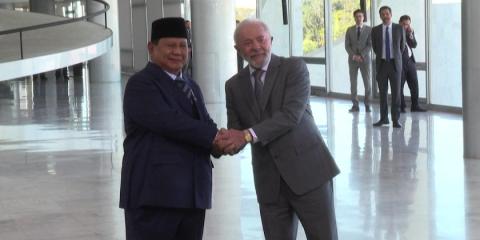
Brazilian President Luiz Inacio Lula da Silva welcomed Indonesian President Prabowo Subianto to the Planalto Palace during his state visit to Brasilia and held a bilateral meeting where they talked about diversifying commercial exchanges, including in the areas of civil aviation and defense products as well as the rapprochement between the Southern Cone and Southeast Asia which would be beneficial for global trade.
mitv
Brazilian President Luiz Inacio Lula da Silva welcomed Indonesian President Prabowo Subianto to the Planalto Palace during his state visit to Brasilia and held a bilateral meeting where they talked about diversifying commercial exchanges, including in the areas of civil aviation and defense products as well as the rapprochement between the Southern Cone and Southeast Asia which would be beneficial for global trade.
mitv
Brazilian President Luiz Inacio Lula da Silva welcomed Indonesian President Prabowo Subianto to the Planalto Palace during his state visit to Brasilia and held a bilateral meeting where they talked about diversifying commercial exchanges, including in the areas of civil aviation and defense products as well as the rapprochement between the Southern Cone and Southeast Asia which would be beneficial for global trade.
mitv

US President Donald Trump hailed West Africa's rich natural resources as he hosted five of its leaders Wednesday. The United States is working tirelessly to forge new economic opportunities involving both the United States and many African nations," Trump said. Trump's administration is seeking to strengthen economic ties with the mineral-rich region as it simultaneously curbs foreign aid to Africa and hits nations with 10 percent import tariffs.
US President Donald Trump hailed West Africa's rich natural resources as he hosted five of its leaders Wednesday. The United States is working tirelessly to forge new economic opportunities involving both the United States and many African nations," Trump said. Trump's administration is seeking to strengthen economic ties with the mineral-rich region as it simultaneously curbs foreign aid to Africa and hits nations with 10 percent import tariffs.
Talks with the presidents of Senegal, Liberia, Guinea-Bissau, Mauritania and Gabon were expected to focus on commercial opportunities and security. All five of the countries invited enjoy rich natural resources, including manganese.
mitv
US President Donald Trump hailed West Africa's rich natural resources as he hosted five of its leaders Wednesday. The United States is working tirelessly to forge new economic opportunities involving both the United States and many African nations," Trump said. Trump's administration is seeking to strengthen economic ties with the mineral-rich region as it simultaneously curbs foreign aid to Africa and hits nations with 10 percent import tariffs.
Talks with the presidents of Senegal, Liberia, Guinea-Bissau, Mauritania and Gabon were expected to focus on commercial opportunities and security. All five of the countries invited enjoy rich natural resources, including manganese.
mitv
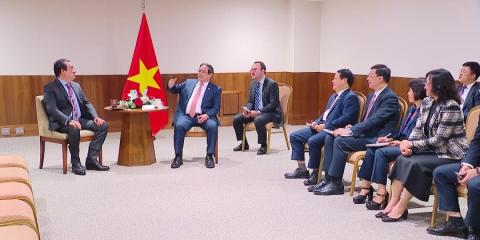
Vietnamese Prime Minister Pham Minh Chinh met with executives of major Brazilian corporations to advance cooperation across multiple sectors in Rio de Janeiro city.
Vietnamese Prime Minister Pham Minh Chinh met with executives of major Brazilian corporations to advance cooperation across multiple sectors in Rio de Janeiro city.
He met with executives of Vale, a multinational group specializing in metals, mining, and logistics. At these meetings, the Prime Minister highlighted Vietnam’s current landscape, key development priorities, and its favourable investment and business environment. He urged Brazilian corporations, business associations, and federations to support the early conclusion of these deals to facilitate business cooperation.
mitv
Vietnamese Prime Minister Pham Minh Chinh met with executives of major Brazilian corporations to advance cooperation across multiple sectors in Rio de Janeiro city.
He met with executives of Vale, a multinational group specializing in metals, mining, and logistics. At these meetings, the Prime Minister highlighted Vietnam’s current landscape, key development priorities, and its favourable investment and business environment. He urged Brazilian corporations, business associations, and federations to support the early conclusion of these deals to facilitate business cooperation.
mitv
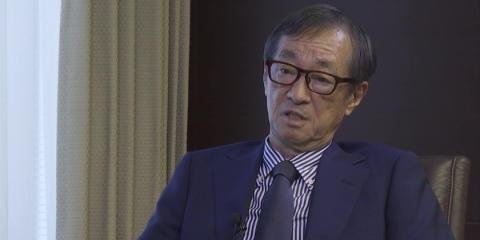
Nippon Steel completed its acquisition of US Steel last month, after a year-and-a-half of negotiations. The Japanese company made the iconic American firm a wholly owned subsidiary after lengthy negotiations to gain approval from the Trump administration. Nippon Steel's Chairman and CEO Hashimoto said that the global trade system had undergone a major change where Japanese companies can play a part in the revival of US manufacturing.
mitv
Nippon Steel completed its acquisition of US Steel last month, after a year-and-a-half of negotiations. The Japanese company made the iconic American firm a wholly owned subsidiary after lengthy negotiations to gain approval from the Trump administration. Nippon Steel's Chairman and CEO Hashimoto said that the global trade system had undergone a major change where Japanese companies can play a part in the revival of US manufacturing.
mitv
Nippon Steel completed its acquisition of US Steel last month, after a year-and-a-half of negotiations. The Japanese company made the iconic American firm a wholly owned subsidiary after lengthy negotiations to gain approval from the Trump administration. Nippon Steel's Chairman and CEO Hashimoto said that the global trade system had undergone a major change where Japanese companies can play a part in the revival of US manufacturing.
mitv

EU chief Ursula von der Leyen and US President Donald Trump had a "good exchange" about trade as Brussels seeks a deal to avoid steep tariffs before the July 9 deadline. The European Commission spokesman said Monday that both leaders spoke by phone on Sunday, adding that "work is ongoing" at all levels to reach an agreement.
mitv
EU chief Ursula von der Leyen and US President Donald Trump had a "good exchange" about trade as Brussels seeks a deal to avoid steep tariffs before the July 9 deadline. The European Commission spokesman said Monday that both leaders spoke by phone on Sunday, adding that "work is ongoing" at all levels to reach an agreement.
mitv
EU chief Ursula von der Leyen and US President Donald Trump had a "good exchange" about trade as Brussels seeks a deal to avoid steep tariffs before the July 9 deadline. The European Commission spokesman said Monday that both leaders spoke by phone on Sunday, adding that "work is ongoing" at all levels to reach an agreement.
mitv
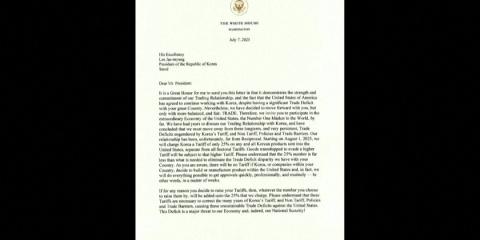
U.S. President Donald Trump said Monday on social media that 25-percent tariffs will be imposed on imports from Japan and the Republic of Korea, respectively, beginning Aug. 1.
U.S. President Donald Trump said Monday on social media that 25-percent tariffs will be imposed on imports from Japan and the Republic of Korea, respectively, beginning Aug. 1.
In his letters addressed to the leaders of the two countries, Trump said the new tariffs will be separate from all other sectoral tariffs. Later on, he announced that similar letters were sent to the leaders of 12 other countries, namely Malaysia, Kazakhstan, South Africa, Myanmar, Laos, Tunisia, Indonesia, Bangladesh, Serbia, Bosnia and Herzegovina, Cambodia, and Thailand, informing them that tariffs ranging 25 percent to 40 percent will be charged starting next month.
mitv
U.S. President Donald Trump said Monday on social media that 25-percent tariffs will be imposed on imports from Japan and the Republic of Korea, respectively, beginning Aug. 1.
In his letters addressed to the leaders of the two countries, Trump said the new tariffs will be separate from all other sectoral tariffs. Later on, he announced that similar letters were sent to the leaders of 12 other countries, namely Malaysia, Kazakhstan, South Africa, Myanmar, Laos, Tunisia, Indonesia, Bangladesh, Serbia, Bosnia and Herzegovina, Cambodia, and Thailand, informing them that tariffs ranging 25 percent to 40 percent will be charged starting next month.
mitv
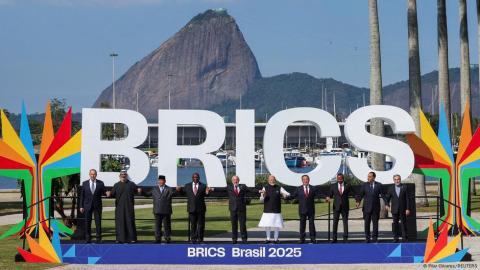
(DW News, July 7, 2025)
Leaders of the growing BRICS group of developing nations met in Rio de Janeiro on Sunday, reaffirming the bloc's commitment to multilateral diplomacy. In his opening remarks, Brazilian President Luiz Inacio Lula da Silva said, "We are witnessing the unparalleled collapse of multilateralism." "If international governance does not reflect the new multipolar reality of the 21st century, it is up to BRICS to help bring it up to date," he said.
(DW News, July 7, 2025)
Leaders of the growing BRICS group of developing nations met in Rio de Janeiro on Sunday, reaffirming the bloc's commitment to multilateral diplomacy. In his opening remarks, Brazilian President Luiz Inacio Lula da Silva said, "We are witnessing the unparalleled collapse of multilateralism." "If international governance does not reflect the new multipolar reality of the 21st century, it is up to BRICS to help bring it up to date," he said.
He also criticized the NATO military alliance, accusing it of fueling a global arms race after it set a defense spending target of 5% of GDP late last month. BRICS countries also condemned US President Donald Trump’s "indiscriminate" tariff policy. They voiced "serious concerns about the rise of unilateral tariff and non-tariff measures which distort trade and are inconsistent with WTO rules," saying such measures were “affecting prospects for global economic development.”
Trump has said that tariff of up to 50% could be imposed on August 1 if countries do not reach deals with Washington by that time. The US president on Sunday also lashed out at BRICS, vowing to impose an extra 10% tariff on the grouping. "Any Country aligning themselves with the Anti-American policies of BRICS, will be charged an ADDITIONAL 10% Tariff. There will be no exceptions to this policy," Trump wrote in a post on his Truth Social social network.
Trump did not clarify or expand on the "Anti-American policies" reference in his post. The bloc, originally formed by Brazil, Russia, India, China, and South Africa, has grown in size with Egypt, Ethiopia, Iran, Saudi Arabia, the United Arab Emirates and Indonesia joining as members last year. It accounts for about half the world's population.
For the first time since becoming China's leader in 2012, President Xi Jinping has opted out of attending the BRICS summit. Xi chose to send his Premier Li Qiang to represent Beijing. China's Foreign Ministry did not say why Xi is skipping the meeting in Rio de Janeiro.
Russian President Vladimir Putin is also staying away, but he made an appearance via videoconference. Putin is wanted by the International Criminal Court for his role in the full-scale invasion of Ukraine. Brazil, as a member of the court, would be obliged to arrest Putin if he entered the country.
In televised remarks, Putin noted that "everything indicates that the model of liberal globalization is becoming obsolete." "The center of business activity is shifting towards the emerging markets," he added. Putin also urged member countries to step up cooperation in various areas including natural resources, logistics, trade, and finance.
Indian Prime Minister Narendra Modi, meanwhile, said BRICS must lead the Global South in an increasingly multipolar world.
Ref - DW News
(DW News, July 7, 2025)
Leaders of the growing BRICS group of developing nations met in Rio de Janeiro on Sunday, reaffirming the bloc's commitment to multilateral diplomacy. In his opening remarks, Brazilian President Luiz Inacio Lula da Silva said, "We are witnessing the unparalleled collapse of multilateralism." "If international governance does not reflect the new multipolar reality of the 21st century, it is up to BRICS to help bring it up to date," he said.
He also criticized the NATO military alliance, accusing it of fueling a global arms race after it set a defense spending target of 5% of GDP late last month. BRICS countries also condemned US President Donald Trump’s "indiscriminate" tariff policy. They voiced "serious concerns about the rise of unilateral tariff and non-tariff measures which distort trade and are inconsistent with WTO rules," saying such measures were “affecting prospects for global economic development.”
Trump has said that tariff of up to 50% could be imposed on August 1 if countries do not reach deals with Washington by that time. The US president on Sunday also lashed out at BRICS, vowing to impose an extra 10% tariff on the grouping. "Any Country aligning themselves with the Anti-American policies of BRICS, will be charged an ADDITIONAL 10% Tariff. There will be no exceptions to this policy," Trump wrote in a post on his Truth Social social network.
Trump did not clarify or expand on the "Anti-American policies" reference in his post. The bloc, originally formed by Brazil, Russia, India, China, and South Africa, has grown in size with Egypt, Ethiopia, Iran, Saudi Arabia, the United Arab Emirates and Indonesia joining as members last year. It accounts for about half the world's population.
For the first time since becoming China's leader in 2012, President Xi Jinping has opted out of attending the BRICS summit. Xi chose to send his Premier Li Qiang to represent Beijing. China's Foreign Ministry did not say why Xi is skipping the meeting in Rio de Janeiro.
Russian President Vladimir Putin is also staying away, but he made an appearance via videoconference. Putin is wanted by the International Criminal Court for his role in the full-scale invasion of Ukraine. Brazil, as a member of the court, would be obliged to arrest Putin if he entered the country.
In televised remarks, Putin noted that "everything indicates that the model of liberal globalization is becoming obsolete." "The center of business activity is shifting towards the emerging markets," he added. Putin also urged member countries to step up cooperation in various areas including natural resources, logistics, trade, and finance.
Indian Prime Minister Narendra Modi, meanwhile, said BRICS must lead the Global South in an increasingly multipolar world.
Ref - DW News

